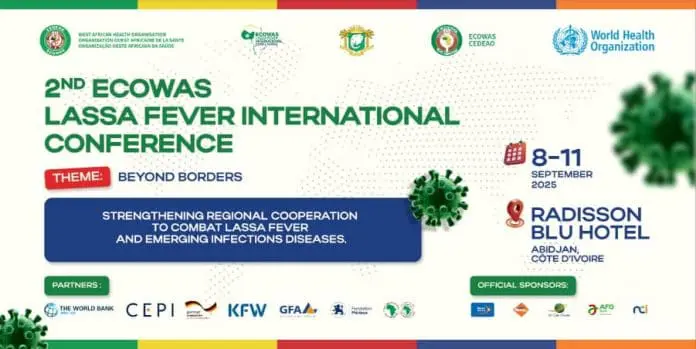By Iyemah David
More than 800 health experts, policymakers, and technical partners from Africa, Europe, and the Americas were in Abidjan for the 2nd ECOWAS International Conference on Lassa Fever.
Director-General of the West African Health Organisation (WAHO), Dr Melchior Aïssi, disclosed this at the closing ceremony of the event on Thursday in Cote d’Ivoire.
He called for stronger regional collaboration, enhanced research, and improved preparedness to combat the deadly disease.
The four-day event brought together participants from 32 countries, featuring over 140 oral presentations, 162 posters, 20 parallel sessions, and 28 plenary sessions.
Dr Aïssi said that Lassa fever was a transboundary challenge that requires collective action, adding that “no country can tackle this alone.
“Our shared intelligence, resources, and regional cooperation are essential to prevent, detect, and respond to outbreaks,” he said.
Representing the Coalition for Epidemic Preparedness Innovations (CEPI), Dr Katrin Ramsauer, Head of the Lassa Fever Disease Programme, highlighted the importance of vaccine research and development.
“CEPI currently supports three vaccine candidates, with clinical trials underway in Nigeria, Liberia, and Ghana.
“Developing vaccines is both a scientific and moral imperative. Together, we can protect the populations most at risk,” she said.
Speaking on behalf of the World Health Organisation (WHO), the Representative of the agency in Senegal, Professor Thinero Baldé, praised the conference for fostering collaboration across governments, scientists, and communities.
“Complex challenges demand complex solutions. The networks and relationships formed here in Abidjan are essential to strengthen surveillance, laboratory systems, and emergency response across West Africa,” he said.
Representing Côte d’Ivoire’s Minister of Health, Dr Koffi Charles, Regional Director at the Ministry of Health, congratulated participants for their contributions and stressed the urgency of translating recommendations into action.
Dr Charles highlighted the importance of regional solidarity and cooperation in building resilient health systems.
The key recommendations from the conference included strengthening regional coordination, expanding national surveillance and laboratory capacities.
It also recommended the scaling up of scientific research, improving community engagement, and enhancing preparedness for health emergencies.
Participants underscored the need for political commitment to prioritise Lassa fever on national health agendas.
The conference was organised by WAHO in collaboration with CEPI, WHO, and the Côte d’Ivoire Ministry of Health.
It served as an affirmation of West Africa’s collective determination to confront Lassa fever and other emerging infectious diseases in the region.




